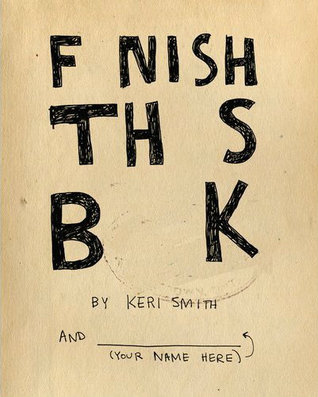Keri Smith may well be the self-help guru this DIY generation deserves. She elicits comparisons with SARK (Susan Ariel Rainbow Kennedy), whose Living Juicy: Daily Morsels for Your Creative Soul and Eat Mangos Naked: Finding Pleasure Everywhere (and Dancing with the Pits) ooze with a new-agey women-who-run-through-the-watercolors vibe, but trades rainbows for a hand-knit aesthetic that’s at once hip and deeply nonthreatening. As a self-described guerrilla artist, Smith flips Chekhov’s maxim that “if you want to work on your art, work on your life,” and the inversion seems to have struck a best-selling chord.
In a culture in which the value of everything from pickles to parenting seems increasingly dependent on viewing every undertaking as artistic, Smith gives her readers the tools to transform normal life into art, suggesting that this alchemy will make us happier. Her work taps into the special ability of art—narrative art most directly—to create a frame around seemingly mundane everyday activities, simply by changing the sort of attention we give them. Tell me I’m writing a book, and I’ll start narrating in my head. Call it, after Duchamp, the urinal effect.
Smith’s latest art-activity book, Finish This Book, depends on this effect. Its lobbying for the aforementioned transformation stems from the opening of a kind of artistic attention, and intention, beyond whatever prompts it gives you. That is, because there are few limits to what can be included in the book—to how you can “finish” it—anything has the potential to become art through transcription into narrative, and so anything has the potential for the same value we’d ascribe to art.
Indeed, Finish This Book is less about making art than it is about an artisanal form of existence: cultivating inspiration, enjoyment, and meaningful doing. But “meaning” here is a fairly loose concept, judging by the lack of rules: messes, halting missteps, and out-and-out destruction are meaningful. So are disguising oneself, hiding in the woods, and keeping track of exactly what one has done during the day. So, obviously, is the meta-task of “finishing” this book.
But a book is not a traditional living space, and inviting imperfect daily activities into it calls for some renegotiation of boundaries. Despite the suggestion that anything can constitute meaningful and literary narrative, a narrative implies choice: at any given moment in the story, one can sit under this tree or that tree, but...
You have reached your article limit
Sign up for a digital subscription and continue reading all new issues, plus our entire archives, for just $1.50/month.
Already a subscriber? Sign in





